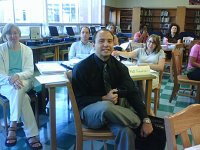Experienced Teachers Reflect on Their First Year
This year I had the opportunity to work with many educators in national and global workshops. On two of these occasions, I asked the teachers to share their wisdom by answering the question, "What I know now that I wish I had known as a first year teacher is . . . "
A recurring theme among their answers was the awareness of -- and responsiveness to -- the needs and interests their students. As one educator remarked, "Each moment presents us with opportunities and challenges. We succeed when we know our students as individuals, know our subjects well, and trust ourselves to respond creatively and learn from our mistakes."
Answers like this demonstrate flexibility and responsiveness among experienced educators -- way beyond the pedagogy they were taught. These educators revealed how they were open to learn about, evaluate and, when appropriate, incorporate changes to their teaching. They displayed this responsiveness when it came to new strategies, curriculum, standards and correlations from neuroscience and cognitive science, as well as changes in student populations, cultures and needs.
Below are some of the responses I got from experienced teachers when they were asked what they wished they’d known as first-year teachers.
In the Classroom
1) State Clear Expectations for Classroom Behavior
Anne Manalo-Hussein, an experienced teacher from Macon County Elementary School, Macon County, Georgia, offers this advice:
2) Practice Mindful Leadership
More good advice comes from Donna Green, Associate Professor of Early Childhood Education at College of the Desert, Palm Desert, California:
3) Be Aware of Perceptions of Threat
And Tanessa Bass, fourth grade teacher at John H. Amesse Elementary in Denver, offers this insight into creating a safe classroom container:
And from Nancy Sell of Screven County High School, Sylvania, Georgia:
And to conclude with a couple of anonymous suggestions:
4) Remember There Are No "Bad" Kids
Jessica Terrazas, elementary school teacher at Universidad de Monterrey, Nuevo Leon, reminds us:
Brenda Lake of Pierce County, Georgia notes that:
5) Invite Risks and Forgive Failure
An anonymous responder writes:
Bill Vance, Department Chair of Religion and teacher at Totino-Grace High School, Fridley, Minnesota suggests:
And Becky Aikens from Taft County, Georgia offers:
How to Engage and Motivate
6) Be a Role Model
Bill Vance has something to say about this, too:
7) Create Meaningful Challenges
Nicole Dahlberg of Hasty Elementary, Cherokee County, Georgia shares:
And here's one of my favorites from Albert Einstein (who didn't actually attend any of those workshops):
8) Remember That the Brain Seeks Pleasure
Angelique Jackson, a professor at Chicago State University, notes:
9) Follow Students’ Lead
Tim Smith, a teacher at Congressional Schools of Virginia in Falls Church, advises:
Bill Vance adds:
10) Teach to Multiple Senses
Angelique Jackson of Chicago State says:
Ashlee Mitchell, MS/CCC-SLP at Stilson Elementary in Bulloch County, Georgia adds:
Your Turn
I hope that, as readers, you will add your own responses to the same question. Help us guide the thousands of new teachers who have just started or are about to begin their very first year in our profession.
